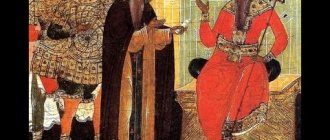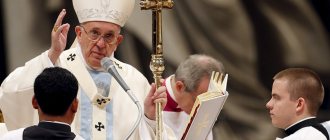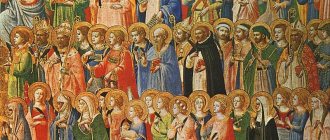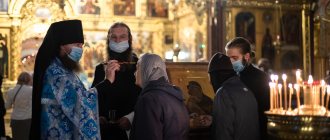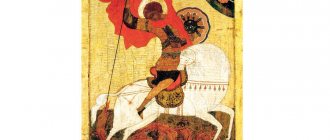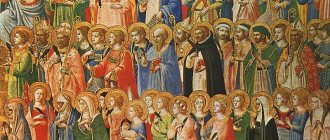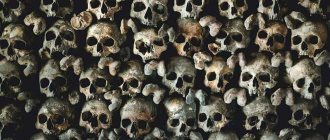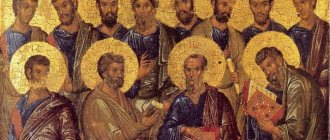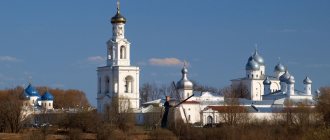The expression “Saints are not born, they are made” is still relevant today. Saints began to be venerated at the very beginning of Christianity, starting with the apostles, and then they were joined by faithful followers of Christ who suffered martyrdom, but retained the faith.
In Orthodoxy, the Feast of All Saints is celebrated on the first Sunday following Trinity, as a sign that holiness is the fruit of the Holy Spirit who descended on Pentecost. According to church canons, it is forbidden to call those endowed with the face of holiness sinless, for only God is sinless.
The veneration of saints has been established in Christianity since ancient times.
The Church honors after death those people who have acquired the Gift of God's grace through the difficult path of repentance, patience, obedience, mortification of their flesh and passions, or martyrdom.
What is holiness
Holiness in Christianity is one of the properties of God, as well as a high degree of closeness to Him. Only God is holy by nature. But a person can be holy through participation in God's holiness. All Christians are called to this. Holiness is a gift from God, but to receive it, a person needs to make an effort. In a persistent struggle against sin, a person acquires Divine grace, which transforms him and unites him with the Spirit of the Lord. This is how Orthodox saints appear.
Orthodox icon of all saints
Encyclopedia of Judaism
saint
(Kadosh) Devoid of all impurity, detached from all everyday life and secularity. S. is one of the attributes of the Lord: Kadosh Israel (Holy of Israel). Particularly outstanding people, righteous people, as well as angels are called S. In the Middle Ages, tens of thousands of Jews died for the sake of the “Sanctification of the Name of the Lord” (Kid-dush Hashem), because they did not want to change their faith. They are called S. The victims of the Holocaust that befell Jews during World War II are also called S.
Read also: Phenazepam instructions for use
Origin of the concept of “holiness”
The Christian concept of “holiness” has Old Testament roots. In the Old Testament, holiness was identified by the Hebrew word kadesh, meaning “set apart.” That is, the holy was perceived as separated from our carnal world and intended for God. For example, the word “kadesh” was used in relation to the temple, to the Jewish people who were chosen by God. A saint was one who had a connection with God and fulfilled the commandments. In relation to God himself, the word “kadesh” meant “divine.”
The prophet Moses told Israel: “In this will be our righteousness, if we are diligent to do all these commandments before the Lord our God, as He commanded us” (Deut. 6:25).
In the New Testament, the Greek words agios (God's holiness and ordination to God), hieros (sacred: the temple or its minister), and hosios (pious person) began to be used to denote holiness. The concept of “holiness” acquired the additional meaning of cleansing from sin, purity, and filling with the Holy Spirit. All Christians were called saints, as people spiritually isolated from pagan darkness. In Russian, the word “holiness” comes from the words “light”, “bright”. However, such a figurative perception should not replace the true, deep understanding of the word “holiness” contained in the Holy Scriptures.
What does holy mean? Let us remember the prophet Samuel
Prophet Samuel
The Orthodox calendar reminds us of saints almost daily. Who are the saints? What do they mean to us? The simplest answer: saints are righteous people, their lives serve as a good model, an inspiring example for Christians.
The simplest answer, as usual, does not reveal the theme of holiness. And we need to add something to this answer. Let's do this not in general, but using a specific example. On September 2, the Church remembers the holy prophet Samuel. Who was he? What does the sanctity of his life mean?
From the Bible we know that Saint Samuel was the last judge of Israel. During his life, the era of judges ended and the era of kingdoms began. After the holy prophet Moses the Lawgiver, the people of God were led and instructed by judges. This is not the name of a position or profession that is well known to everyone, but the name of a special ministry among the people of God. The Lord Himself appointed people to such service. It turns out that here “judge” is also the name of a special gift of grace, in which we need to see the Lord’s care for His people.
It so happened that the people of God during the time of the holy judge Samuel watched with close attention how other tribes lived, ruled by kings. And he decided that it would be nice to have a king too. The familiar desire to “be like everyone else”... The desire turned out to be strong enough not to sit idly by. The people gathered and came to Samuel and asked to appoint a king for them. How did this request sound? It's hard for me to find words...
In the presence of the living judge of God, they asked for a king. They asked the judge directly
In the presence of the living judge of God, they asked for a king. They asked the judge directly.
Let’s imagine for a moment: a wife approached her husband, with whom she had lived for quite a long time, he loved her with all his heart, and asked: “I know you treat me well. Help me find a husband like my neighbor. The same handy and able to live. And, of course, wealthy." How does it feel for him to hear this?
Let us imagine how difficult it was for Saint Samuel to accept the request for a king. The Lord revealed to the judge what was hidden behind this request: it was not God’s judge Samuel who was “sent into retirement,” but something worse. Not only was Samuel no longer needed, God became... Sorry, I can’t raise my hand to finish writing.
All these events are described in the First Book of Samuel. Saint Samuel found out whether there were any claims against him personally. Maybe Samuel offended someone? “No,” they say, but the request to replace the judge with a king remains. No one has made any complaints against the judge, people just need someone else “in his place.” And with him, someone else, a new, happier life will begin for the people and other relationships will be built in society.
With God's help, Samuel was able to explain what was wrong with this request. What was the people's reaction? Fear: “God will punish severely now. Thousands and thousands will die." The fate of the people hangs in the balance. They felt terrified.
“And all the people said to Samuel, Pray for thy servants before the LORD thy God, lest we die; for to all our sins we added another sin when we asked for a king.
And Samuel answered the people: do not be afraid, this sin has been committed by you, but do not depart from the Lord... The Lord will not abandon His people for the sake of His great name... and I also will not allow myself to sin before the Lord to stop praying for you (καὶ ἐμοὶ μηδαμῶς τοῦ ἁμαρτεῖν τῷ Κυρίῳ ἀνιέναι τοῦ προσεύχεσθαι περὶ ὑμ ῶν), and I will guide you on the good and straight path; only fear the Lord and serve Him truly, with all your heart, for you have seen what great things He has done to you; if you do evil, then both you and your king will perish” (1 Sam. 12: 19–25).
They repent. They see that the request addressed to Samuel was sinful. And it’s a considerable sin. Then they ask differently: “Pray so that we don’t die now.”
Seeing repentance, albeit very imperfect, Samuel consoles them. He will definitely pray. Samuel considers it a sin to dwell on the offense inflicted on him and stop praying for an ungrateful people. Samuel will not leave them. And, what is much more important, the Lord will not leave them, will not abandon them.
Not because they are so good, but because He is good.
Samuel is ready to “step aside,” but is not ready to forget about the people. Samuel will take care of him. This is the stamp of holiness
This doesn't mean you can do whatever you want and get away with it. Apostasy from the Lord and the cultivation of sin will lead to destruction, as always happens. Let's pay attention to whom Samuel is talking about. About the people and the king: “If you do evil, then both you and your king will perish.” That is, the request for a king will still be respected. The holy judge Samuel is ready to “step aside,” but is not ready to forget about the people. Samuel will take care of him.
This is the stamp of holiness.
The Lord has many saved souls, purified and sanctified by God. So many. And in the calendar we read relatively few names of saints revealed to the Church. Revealed through what? Through caring for the people, intercessory prayers. Those same living prayers about which Saint Samuel said: “I will not allow myself to sin before the Lord so as to stop praying for you.”
Saints are righteous people who love God and love us, and do not abandon us even when we sin gravely. The saints do not stop praying for the people.
Who are the saints in Christianity
Thus, holy people in Orthodoxy are not just good and pious, but those who have opened their purified hearts to God in an effort to unite with Him. And the more a person is illuminated by grace, the better he sees his imperfection and distortion by sin. A true saint will be a righteous person for those around him, but he will perceive himself as the last sinner.
Separately, it is worth noting that the concepts of “holy” and “sinless” are synonymous only in relation to God. God is holy and sinless. A holy person does not mean sinless. But he has a persistent desire to overcome sin with God's help. Let us remember the words of the Holy Scripture: “A righteous man will fall seven times and rise again” (Proverbs 24:16).
Archpriest Andrei Tkachev in one of his sermons by Fr.
Metropolitan Anthony of Sourozh in one of his conversations called the saints people through whom God acts and shines. Through them the Spirit of the Lord can perform miracles. During their lifetime, many Orthodox saints acquired the gift of clairvoyance, healing the sick, and after death they help those who pray to them. Often the remains of saints remain incorrupt. On the basis of these miracles and popular veneration, the Church canonizes God's saints, that is, glorifies them as saints.
Such a procedure in itself does not make a person a saint; it only states what has already happened in heaven long ago. The canonization of a righteous person does not imply approval of all his statements or actions. The saints of the Orthodox Church were people of their era, often with their own mistakes and infirmities, which did not prevent them from approaching God.
Why pray to the saints if there is Christ?^
- Because it pleases God that way. Evidence of numerous cases of help from saints runs throughout the history of the Church. If it was not pleasing to God, then He would not have given them such service. Similarly, Angels were created by God, each of whom was entrusted with a specific ministry by God; it would be naive to think that the Lord could not do without them.
- Christ not only accepted, but also set as an example the centurion, who did not personally ask Him to heal the servant, but sent mediators with prayer - Jewish elders and friends (Luke 7: 1-10).
- If the living can ask each other for prayers, then what prevents us from calling the righteous, whose holiness is attested by the Church, to be prayer companions to God? Do people automatically lose love and compassion when they lose their body?
- The church is a family. If we communicate with the head of a family - the father, this does not mean that it is necessary to ignore cousins.
- We can say that prayer to saints is a form of prayer to God. According to the Monk Paisius the Svyatogorets, “our prayers to the Most Holy Theotokos and the saints are ultimately all addressed to Christ.”
- The Church of Christ is the totality of the heavenly and earthly churches. The heavenly and earthly Church is one Body, the Head of which is Christ. All of us, including the saints, are members of one Body. But don’t the members of one body take care of each other, especially since the Head of the Church Himself sets love as the highest commandment!
- Those who are saved in the Church receive the power and life of Christ. A synonym for the word holiness is deification. The saints help us not through their own efforts, but through the power (grace) of God. The Apostle Paul testifies: “It is not I who live, but Christ who lives in me” (Gal. 2:20).
Sometimes they say - I pray in my own words, I don’t need other prayers. It’s the same as what a person says - why read poems? Someone wrote them. Well, I wrote it because of the state I was experiencing. As one modern poet said, “alas, we will not write more than what is in our souls, my friend.” And through the sublime feelings that someone expressed in poetry, a person penetrates into this poetically sublime state. It is the same through prayers - the saints who composed these prayers pray with us, and we thus, if possible, each according to our own strength, penetrate into this state of prayer.
***
Saints are “geniuses of religiosity.” O. Sergius Bulgakov
Just as we judge the meaning of music not by restaurant hits, but by Mozart and Bach, just as we form an idea of the essence of painting not only on the basis of comics, so we must judge a spiritual feat not only by a familiar parishioner. Deacon Andrey
History of Holiness in Christianity
In the Old Testament you can find examples of the first prayerful invocations of saints. For example, King David mentioned the forefathers Abraham, Isaac and Israel in his appeals to God.
Already in the first centuries of Christianity, special days were established to honor people who pleased God. First of all, the apostles and first martyrs for Christ. Martyrdom was perceived as indisputable evidence of God's chosenness, the highest form of service to God. Therefore, even in the era of persecution of the first Christians, martyrs were especially revered Orthodox saints. The days of their death were considered as birthdays in the New Life. Liturgical commemorations of the martyrs were held, which united Christian communities. The relics of the martyrs were present in every temple, and their tombs became the object of pilgrimages. The memory of the martyrs was reverently preserved and passed on to new generations of Christians. Prayer books and church services were composed in honor of these saints.
It was martyrdom as the triumph of grace over death that became the first form of holiness recognized by the Church. A procedure emerged for the formal glorification of martyrs, that is, the solemn church-wide recognition of their feat and holiness. Based on the veneration of martyrs, the veneration of other saints subsequently developed. In order to celebrate the peculiarities of the life and deeds of various saints, new faces of holiness were formed. The doctrine of veneration of saints also developed as a response to heresies (false teachings).
Who were we before Christ and who have we become in Him?
Conversion to Christ, according to the Apostle Paul, becomes a kind of watershed in human life. After all, we were dead in the trespasses and sins in which we once lived, according to the custom of this world, according to the will of the prince of the power of the air, the spirit that is now at work in the sons of disobedience (cf. Eph. 2 :1-2). The prince of the power of the air is the devil, Satan. But how to understand these words? Indeed, in the previous chapter the apostle called Christ the Head of all things heavenly and earthly. Here the Apostle Paul says that before turning to Christ, people were in the power of the devil, whose influence and harmful breath darkened a person’s entire life. Therefore, we all once lived according to our carnal lusts, fulfilling the desires of the flesh and thoughts, and were by nature children of wrath (Eph. 2 :3). The devil continues to operate in those who resist God.
But God, rich in mercy, because of His great love with which He loved us, even when we were dead in trespasses, made us alive together with Christ (Eph. 2 :4-5). Christ dies for us and rises again so that we can all receive a new life sanctified by God. We are saved by grace (Eph. 2 :5). The death and resurrection of Christ make us partakers in the eternal life of God. Therefore, the apostle writes that God raised us up and seated us in the heavenly places in Christ Jesus, in order to show in the coming centuries the exceeding riches of His grace in kindness to us in Christ Jesus (Eph. 2 :6-7). We are not simply delivered from death in sins and given life. The life given to us is an eternal existence in the glory of God. The Apostle repeats once again: By grace you have been saved through faith, and this not of yourselves, it is the gift of God (Eph. 2 :8). All this because we are His workmanship, created in Christ Jesus for good works, which God prepared in advance for us to walk in (Eph. 2:10 ).
Once upon a time, the pagans were far from God and from the covenant given to the people of Israel. But Christ made both one and destroyed the barrier that stood in the middle, abolished the enmity with His flesh, and the law of the commandments with teaching, in order to create in Himself one new man from the two, establishing peace, and in one body to reconcile both with God through the cross, killing the enmity on German (Eph. 2 :14-16). The two of whom Christ formed the new man are two different nations: the people of Israel and the people of the Gentiles. Saint John Chrysostom compares the Israelites and the pagans with two statues - silver and tin. Having melted these statues, the Lord formed a new statue - golden, that is, he united both of them in Christ. Therefore, we all have access to the Father in one Spirit (Eph. 2:18 ). Christ becomes for all of us the cornerstone (foundation), on which, as the apostle writes, the whole building, being harmoniously put together, grows into a holy temple in the Lord, on which you also are built into a habitation of God by the Spirit (Eph. 2 :21-22) .
Orthodox saints and saints
The faces of holiness are the various categories into which saints are divided in Orthodoxy during their canonization. The fact that saints belong to different ranks does not mean that some of them are “holier” or more authoritative than others. Holiness, that is, closeness to God, is the same for everyone. Metropolitan Hilarion (Alfeev) in his lecture “Faces of Holiness” points out that assignment to a certain face marks the time of life and the rank of a saint, the essence of his spiritual achievement. Knowing the peculiarities of the lives of the saints and studying their experience of salvation, Christians are inspired to imitate God’s saints and prayerfully communicate with them. Also, special holiday services are written for various saints.
Let us present the most famous faces of holiness.
Apostles are disciples of Jesus Christ (Peter and Paul).
Unmercenaries are Orthodox saints who became famous for their selflessness, their renunciation of wealth for the sake of saving their souls (Cosmas and Damian).
The pious are pious rulers. As a rule, monarchs and princes (Alexander Nevsky, Yaroslav the Wise).
Martyrs are Christians who accepted violent death for their faith (Cyprian and Justina). Great martyrs are those who have undergone particularly cruel torture (Panteleimon, St. George the Victorious). Hieromartyrs are martyrs who had holy orders: bishops, priests, deacons (Macarius of Kiev, Patriarch Hermogenes). Venerable Martyrs - Martyrs-monks (Eugene of Rome, Gregory of Pechersk).
Confessors are Christians who openly professed the faith and were tortured for it, but survived and died a natural death (John the Russian, Maximus the Confessor).
The righteous are the laity or representatives of the white clergy revered for their righteous life (John of Kronstadt, Simeon the God-Receiver).
ascetic monks (Sergius of Radonezh, Seraphim of Sarov).
Prophets are persons mentioned in the Bible who preached and proclaimed God's will to the people (Elijah, John the Baptist).
Equal to the Apostles are saints who, like the apostles, preached the Gospel and converted peoples to Christianity (Queen Helena, Princess Olga).
Saints are bishops glorified as saints (Ignatius Brianchaninov, Theophan the Recluse).
Passion-bearers are Christian saints who humbly and kindly suffered for the fulfillment of the Commandments of God (princes Boris and Gleb, Tsar Nicholas II and his family).
Wonderworkers are those saints who became famous for the gift of miracles (Nicholas the Pleasant, Spyridon of Trimifuntsky).
Fools ( blessed ) are ascetics who, in the name of God, took on the image of madmen (Basily the Blessed, Andrei the Fool).
Halo - a symbol of holiness on the icon
This is the radiance around the head of the saint, which is written on the icon. It means the Grace of God given to him. The tradition of depicting a halo has Old Testament origins: according to the Bible, from the face of the prophet. Moses, to whom God spoke, had such a radiance that he had to cover it with a cloth (Ex. 34:29).
“When Moses came down from Mount Sinai, and the two tablets of the testimony were in Moses’ hand as he descended from the mountain, Moses did not know that his face began to shine with rays because God spoke to him” Exodus 34:29
Prayer to all the saints who have pleased God from all eternity
Troparion, tone 4
And throughout the whole world Thy martyr,/ as with scarlet and visor,/ Thy Church is adorned with the blood,/ with them cries out to Thy Christ God:/ unto Thy people Thy bounties have come down,/ peace Grant to Thy habitation, // and to our souls great mercy.
Translation: With the blood of Your martyrs who suffered throughout the world, clothed as in purple and fine linen, through their lips Church cries out to You, O Christ God: “Send down Your mercies to Your people, grant peace to Your people and great mercy to our souls!”
Kontakion, tone 8
Like the firstfruits of nature, to the Planter of creation,/ the universe brings to You, Lord, God-bearing martyrs./ By those prayers in the deep world Thy Church, // Thy residence, has been preserved by the Mother of God by many more kindly
Translation: As the first fruits of nature, to the Planter of all creation, the universe brings, to You, O Lord, God-bearing martyrs. Through their prayers and the intercession of the Mother of God, preserve Your Church
Prayer 1
To you, O all holiness, as guiding lamps, who with your deeds illuminated the path of the Heavenly sunrise, I, a great sinner, humbly bow the knee of my heart and from the depths of my soul I cry: beg for me, O Lover of Mankind May the Lord of God not allow us to wander further into the paths of sin, but may He enlighten us my mind and heart with the light of my grace, as if we illuminate and strengthen it, I will be able to continue the rest of my earthly life on the right path without stumbling and through your intercession to the Most Good Lord I will be honored to be a small partaker of your spiritual meal in the Heavenly Palace of the King of Glory. To Him, with His Beginning Father and the Most Holy, Good and Life-Giving Spirit, be glory, honor and worship forever and ever. Amen.
Read us conveniently on social networks:
Tags: Orthodox saints, holy lands of the Russian land, holy people, saints of the Orthodox Church
